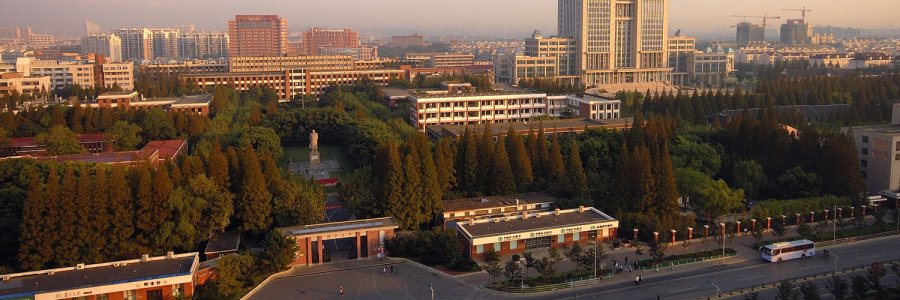
复旦大学创建于1905年,原名复旦公学,是中国人自主创办的第一所高等院校,创始人为中国近代知名教育家马相伯。校名“复旦”二字选自《尚书大传•虞夏传》中“日月光华,旦复旦兮”的名句,意在自强不息,寄托当时中国知识分子自主办学、教育强国的希望。1917年复旦公学改名为私立复旦大学;1937年抗战爆发后,学校内迁重庆北碚,并于1941年改为“国立”;1946年迁回上海江湾原址;1952年全国高等学校院系调整后,复旦大学成为文理科综合大学;1959年成为全国重点大学。
上海医科大学创建于1927年,是中国人自主创办的第一所高等医学院校。建院时定名为第四中山大学医学院,1932年改名为国立上海医学院,1952年更名为上海第一医学院,1959年成为全国重点大学,1985年改名为上海医科大学。
2000年,复旦大学与上海医科大学合并,成立新的复旦大学,进一步拓宽了学校的学科结构,办学实力进一步增强,已经发展成为一所拥有哲学、经济学、法学、教育学、文学、历史学、理学、工学、医学、管理学、艺术学等11个学科门类的综合性研究型大学。
2013年,学校有普通本专科生12933人,研究生16026人,留学生3216人(其中攻读学位的留学生2092人);另有成人教育、网络教育本专科生13259人。有专任教师2490人,其中高级职称1771人。有中国科学院、中国工程院院士39人,其中双聘院士12人,教育部“长江学者奖励计划”特聘教授58人、讲座教授34人,“国家重点基础研究发展计划(含重大科学研究计划)”项目首席科学家29人。有直属院(系)30个,设有本科专业69个,一级学科博士学位授权点35个,博士学位授权学科、专业点154个(其中自设30个,专业学位2个),硕士学位授权学科、专业点243个(其中自设51个,专业学位24个),并设有29个博士后科研流动站。有11个一级学科国家重点学科、19个二级学科国家重点学科,10个上海高校一流学科(A类)。有国家重点实验室5个,教育部工程研究中心4个,教育部重点实验室12个,卫生部重点实验室9个,总后卫生部重点实验室1个,上海市重点实验室10个。学校还拥有中山医院、华山医院等6家直属附属医院和一批非直属附属医院。
学校已经形成“一体两翼”的校园格局:即以邯郸校区、江湾新校区为一体,以枫林校区、张江校区为两翼。占地面积244.32万平方米,校舍建筑面积149.23万平方米。
一百多年来,学校在人才培养、科学研究、服务社会、文明传承与创新等方面为国家作出了突出贡献。复旦师生谨记“博学而笃志,切问而近思”的校训,严守“文明、健康、团结、奋发”的校风,力行“刻苦、严谨、求实、创新”的学风,发场“爱国奉献、学术独立、海纳百川、追求卓越”的复旦精神,正按照党和国家的要求,发扬优良传统,不断开拓创新,以服务国家为己任,以培养人才为根本,以改革开放为动力,深入推进内涵建设,全面提高教育质量,加快建设具有中国特色的世界一流大学,为实现中华民族伟大复兴的中国梦作出新的更大的贡献。
Fudan University was established in 1905 as Fudan Public School. It was the first institution of higher education to be founded by a Chinese person, renowned modern educator Ma Xiangbo. The school’s name was chosen from the “Biography of Yuxia” in the Classic of History (《尚书大传 虞夏传》), where the two characters fù复 (“return”) and dàn旦 (“dawn”) are found in the famous lines “Brilliant are the sunshine and moonlight, again the morning glory after the night,” signifying continuous self-renewal, and expressing the hope that China could become a country with a strong higher education system run by Chinese intellectuals. In 1917 the name was changed from Fudan Public School to Fudan Private School; in 1937 after the outbreak of the Anti-Japanese War, the school moved to Beipei in Chongqing, and in 1941 it became state-run; in 1946 it moved back to its original location in Jiangwan, Shanghai. After the nationwide restructuring of institutions of higher education in 1952, Fudan University became a comprehensive university of arts and sciences; in 1959 it became one of the first National Key Universities along with Shanghai First Medical College (later known as Shanghai Medical University).
Shanghai Medical University was founded in 1927. It was the first medical school to be founded by a Chinese person. It was originally named Fourth Sun Yat-sen University Medical College.
Fudan University was merged with Shanghai Medical University in 2000, forming a new, stronger Fudan University with a broader set of disciplines: medicine, sciences, and arts. As one of the first participants in the 211 and 985 Projects, Fudan has developed into a comprehensive research university, with Departments of Philosophy, Economics, Law, Education, Literature, History, Science, Engineering, Medicine, and Management.
Fudan is home to 14,100 undergraduates and associate degree candidates, 14,800 graduates including 3000 foreign degree candidates, 2,700 staff and 3,100 full-time teaching faculty members. Fudan hosts 34 members of Chinese Academy of Science and members of Chinese Academy of Engineering, 99 Chair Professors of Chang Jiang Scholars Program, and 30 National Key Basic Research Program of China (also named “973 Program”) PIs. There are 28 schools and independent departments with 70 bachelor degree programs, 35 doctoral degree programs of Level I academic disciplines, 154 doctoral degree programs, 224 master degree programs, and 29 post-doctoral programs. There are 11 Level I national key academic disciplines and 19 Level II national key academic disciplines. Fudan hosts around 300 research institutes including 5 national key labs, 38 ministerial or provincial key labs and engineering centers, 5 “Project 985” Science and Technology Innovation Platforms and 7 “Project 985” Arts and Social Sciences Innovation Bases.
The campus is laid out as a main area consisting of the Handan Street Campus and Jiangwan New Campus areas, along with two side campuses, Fenglin Campus and Zhangjiang Campus, covering a total area of 2.4432 square kilometers. The total area of all school buildings is 1.4923 square kilometers. Eleven hospitals are also affiliated with the school, including Zhongshan Hospital and Huashan Hospital, with a total of 15,000 doctors, nurses, and personnel.
Fudan University celebrated its 100th anniversary in 2005. Chinese president Hu Jintao sent a letter of congratulations, expressing his hopes that the school will continue its tradition of excellence while developing and innovating into the future, building itself into a world-class comprehensive university, fostering development of persons of talent, ability, and integrity, and putting forth a new, even greater contribution towards building a prosperous society and realizing the Chinese people’s great revival.
Over the past hundred years, the school has made outstanding contributions to the country by developing talent, innovating in science and technology, carrying forward civilization, and serving society. Students and teachers of Fudan always keep in mind the school motto “Rich in knowledge and tenacious of purposes, inquiring with earnestness and reflecting with self-practice,” maintain the school spirit of “civilized, healthy, united, rousing,” practice the school traditions of being “hard working, rigorous, result-oriented, and innovative,” and develop the Fudan spirit of “patriotic service, academic independence, a diversity of approaches, and pursuit of excellence.” They make great contributions to the liberation and development of the people, the construction and development of the nation, and the civilization and progress of society.